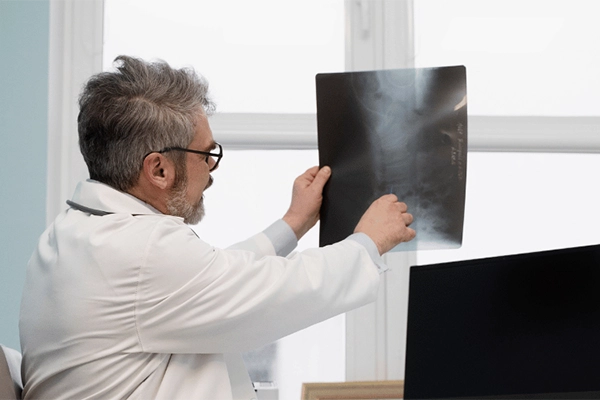Topics
Blood pressure is measured using two readings: systolic, which reflects artery pressure when the heart contracts, and diastolic, indicating pressure when the heart refills with blood between heartbeats.
A sphygmomanometer, comprising an inflatable cuff and mercury gauge, measures blood pressure. The cuff is placed on the upper arm, inflated, and then slowly deflated while the doctor monitors the gauge and listens to the heartbeat with a stethoscope.
Alternatively, digital devices measure pulse and blood pressure automatically. After measurement, readings are given as systolic over diastolic, such as "120 over 80" or 120/80 mmHg, a normal blood pressure reading.
What is low blood pressure?
Low blood pressure, medically referred to as hypotension, happens when blood flows through your blood vessels at pressures lower than normal.
What causes low blood pressure?
Blood pressure is regulated by the body’s various systems, which include organs, hormones, and nerves. For instance, the autonomic nervous system issues the “fight-or-flight” signal that directs the heart and other systems in the body to increase or decrease blood pressure, depending on the situation.
There are other causes of low blood pressure, which vary from one person to another:
- Time of the day, whereby blood pressure is lower in the morning
- Stress level
- When you are cold, your heart rate decreases, and your blood pressure drops
- Pregnancy
- Dehydration
- Rare nerve conditions – postural or orthostatic hypotension
- Diabetes
- Parkinson’s disease
- Damage to adrenal glands
- Heart condition such as heart attack or heart failure
- Medication to treat high blood pressure, depression, or Parkinson’s disease
- Losing blood from an injury caused by an abrupt drop in blood pressure
- Septic shock and toxic shock syndrome
- Anaphylactic shock or severe allergic reaction
- Cardiogenic shock
What are the symptoms of low blood pressure?
Low blood pressure (hypotension) typically does not cause symptoms on its own. If you have low blood pressure without any accompanying symptoms, treatment usually is not necessary.
However, low blood pressure may indicate insufficient blood flow to vital organs, including the brain, leading to subsequent low blood pressure symptoms such as:
- Dizziness or lightheadedness
- Confusion
- Fainting
- Feeling tired or weak
- Blurry vision
- Headache
- Neck or back pain
- Nausea
- Heart palpitations (feeling of your heart skipping a beat, fluttering, or beating too hard or too rapidly)
Postural or orthostatic hypotension happens when your blood pressure drops suddenly following a sudden movement. For instance, you might feel dizzy or faint when transitioning from lying down to sitting up or sitting to standing. This can result in loss of balance or falling over, accompanied by symptoms like lightheadedness, blurred vision, or even loss of consciousness.
Postural or orthostatic hypotension symptoms typically resolve within a few minutes as your blood pressure adjusts to the new position. This type of low blood pressure tends to become more common with age, increasing the risk of frequent falls, and similar symptoms may also occur after exercising.
How is low blood pressure diagnosed and treated?
Low blood pressure is typically diagnosed through medical history, physical examination, and sometimes additional tests.
Treatment for low blood pressure (hypotension) is generally unnecessary if you do not experience any symptoms. If a cause for low blood pressure is identified, your doctor will recommend treatment accordingly.
For example, they may suggest:
- Changing medication or adjusting your dose if it caused your blood pressure to drop.
- Suppose your doctor suspects an underlying disorder like a heart condition, adrenal gland failure, or nerve condition is causing your low blood pressure, you may be referred to a relevant specialist for additional tests and treatment in that case.
- Dehydration, resulting from decreased water and salt levels in the body reduces blood volume, can lead to low blood pressure. This condition can often be treated effectively by increasing fluid and salt intake.
- Blood circulation and pressure can be improved by wearing compression stockings.
When should you see a doctor for low blood pressure?
You should consult a doctor if you constantly experience symptoms of low blood pressure, such as dizziness and fainting.
You may be wondering which is worse, low or high blood pressure? Most healthcare professionals will only view chronically low blood pressure as dangerous if it leads to obvious signs and symptoms. Meanwhile, dubbed a “silent killer”, high blood pressure shows no obvious symptoms and can potentially lead to health threats if left untreated.
Make an appointment at Pantai Hospitals
Get in touch with us to book an appointment today if you suspect you have low blood pressure or are experiencing symptoms or have concerns or questions regarding low blood pressure.
A dedicated team of expert cardiologists at Pantai Hospitals is available for consultation to provide the best care and assistance. We assure you the best possible care tailored to your specific needs.
Pantai Hospital has been accredited by the Malaysian Society for Quality in Health (MSQH) for its commitment to patient safety and service quality.












